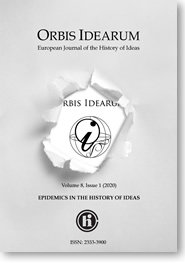Single issue
Epidemics in the History of Ideas
Volume 8, Issue 1 (2020)
There is a general consensus that the history of ideas was not born just to satisfy the idle curiosity of researchers regarding ways of thinking and communicating in the past. The history of ideas was also born to respond to the challenges of the present and the future, to help us make use of the knowledge we have inherited - although too often forgotten - and that is preserved in paper and digital archives. The COVID-19 pandemic that is currently disrupting the lives of billions of people in all nations of Earth invites reflection on past epidemics and pandemics. How have the plagues that have periodically affected mankind been studied, understood, and combated? How have the human dramas of contagion been portrayed in medical and scientific literature, legal codes, sacred texts, political speeches, newspapers and magazines, novels and other literary works? How have such experiences influenced other aspects of our lives, and in what ways can these effects be traced over time? What are the differences and similarities between the reactions to past epidemics and the reactions we are observing today against the threat of the coronavirus? In the current issue authors propose studies and reflections on these difficult topics, and thereby illustrate how knowledge of the past is helpful not only today, but also for moving constructively into tomorrow.
Wrath, Mercy, Pestilence, and Plague. How the Wisdom of the Ancients Offers Courage in Pandemic (en)
Antonio MarturanoVirality: Notes on a Concept Crossing Disciplines (en)
Roberto PauraThe Hermeneutics of Epidemics in Christian Thought and the Idea of the Punishing God (it)
Riccardo CampaThe Cause of the Pestilence in Florence According to Serafino Razzi. Notes on the Manuscript “Life and Death of Fra Girolamo Savonarola” (it)
Paweł PrüferBook Review: L’arte di passeggiare e fare le rivoluzioni: Per una sociologia della flânerie (pl)




